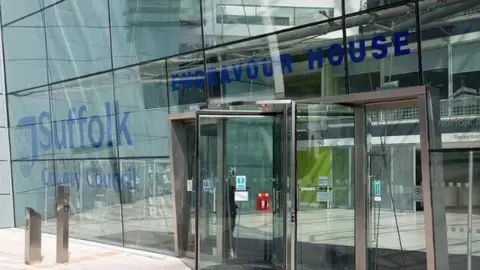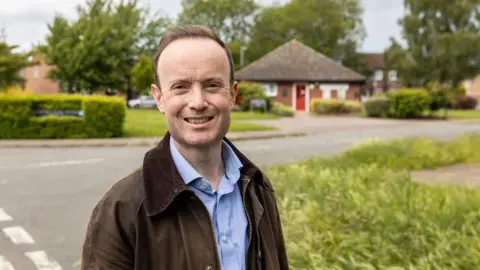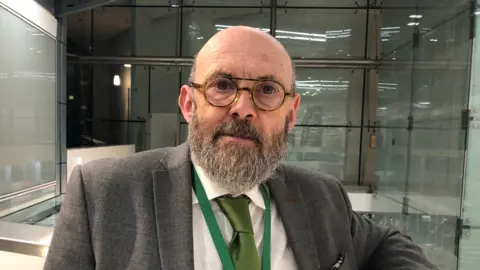Council calls for one-authority devolution deal
 BBC
BBCThe county council has said it wants to see one authority in Suffolk as part of the current devolution process.
Plans to draw up initial suggestions on how to reorganise local councils as part of devolution proposals are due before government at the end of March.
The Conservative-run Suffolk County Council argues a single body, rather than two unitary authorities for example, "would make delivering public services simpler, cheaper and quicker".
The opposition Green, Liberal Democrat and Independent Group said: "We will fight for keeping the 'local' in local democracy every step of the way."
Suffolk and Norfolk have been fast-tracked for devolution, which means the county would share a mayor with Norfolk, and existing councils would be scrapped and replaced with a number of unitary authorities - instead of the current two-tier system of county and district councils.
Some political leaders have already voiced their opposition to one council for the whole of Suffolk.
Caroline Topping, the Green leader of East Suffolk Council, said: "We do not believe that a single, vast council covering the whole county would best serve those who matter most.
"There are far better options under consideration which would keep democracy local, including a two-unitary east and west model."
Labour-run Ipswich Borough Council said it wanted to see a Greater Ipswich Unitary Council included in future plans.
 Jo Thewlis/BBC
Jo Thewlis/BBCIf the county council gets its wish, all council services, such as waste collection and disposal, housing, social care, planning, highways maintenance, leisure, school placements and travel and street cleaning, would all be provided by one authority.
Richard Rout, county council cabinet member for devolution and local government reform, said: "The financial benefits of unitary local government are clear.
"By cutting unnecessary bureaucracy, the new council – whoever may serve on it – will have more money to invest in frontline public services, ensuring better value for taxpayers.
"If the government is serious about delivering savings, efficiencies, better outcomes for residents and financially sustainable local government, then there is only one answer - one council for Suffolk.
"Moreover, it is the only model that meets their criteria of serving over 500,000 people."
 Vikki Irwin/BBC
Vikki Irwin/BBCAndrew Stringer, leader of the Green, Liberal Democrat and Independent Group at the county council, said: "We are disappointed but not surprised that the county council administration are proposing a single unitary council for Suffolk before the business case has even been written.
"We are in favour of devolution as a principle that genuinely empowers and brings decision-making closer to local communities, but this is not what is being proposed."
How many councils could Suffolk have?
Currently there is one county council and five district councils in Suffolk:
- Suffolk County Council
- Babergh District Council (politically independent from Mid Suffolk, but shares provision of most services with it)
- East Suffolk Council (formed by merging Suffolk Coastal and Waveney district councils in 2019)
- Ipswich Borough Council
- Mid Suffolk District Council
- West Suffolk Council (formed by merging Forest Heath and St Edmundsbury district councils in 2019)
Government guidance suggests new unitary authorities should aim to serve a population of 500,000 or more.
However, that is not a fixed rule and areas with fewer people can put forward proposals.
Suffolk has a population of about 760,000 and some are arguing the county should have two or more new councils.
What happens next?
As Suffolk is part of the government's Devolution Priority Programme, the reorganisation and devolution is happening quickly, and new structures could be in place by May 2026.
Below is a timeline as the BBC understands it:
March 2025 - Suffolk councils to agree and submit by 21 March their interim suggestions of how councils should reorganise themselves.
May 2025 - Suffolk County Council elections postponed
Autumn 2025 - final plans for Suffolk's authorities sent to government for approval
May 2026 - Mayoral election for Suffolk and Norfolk
May 2026 - Shadow authority elections for new agreed authorities
Follow Suffolk news on BBC Sounds, Facebook, Instagram and X.
